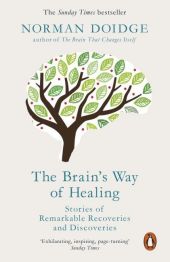 Neuerscheinungen 2016Stand: 2020-02-01 |
Schnellsuche
ISBN/Stichwort/Autor
|
Herderstraße 10
10625 Berlin
Tel.: 030 315 714 16
Fax 030 315 714 14
info@buchspektrum.de |

Norman Doidge
The Brainīs Way of Healing
Stories of Remarkable Recoveries and Discoveries
2016. 448 S. 198 mm
Verlag/Jahr: PENGUIN UK 2016
ISBN: 0-14-198080-X (014198080X)
Neue ISBN: 978-0-14-198080-5 (9780141980805)
Preis und Lieferzeit: Bitte klicken
īThis is a book of miracles. Fascinating... An absorbing compendium of unlikely recoveries from physical and mental ailments offers evidence that the brain can heal... brings Oliver Sacks to mindī Lisa Appignanesi, Observer
The Brainīs Way of Healing explores the astonishing advances in the discovery of neuroplasticity, showing that the brain has its own unique way of healing, only recently uncovered. Norman Doidge discusses a series of remarkable recoveries: patients told they would never improve have years of chronic pain alleviated or damage from debilitating strokes undone, and symptoms of multiple sclerosis, Parkinsonīs disease, brain injury, autism or learning disorders are reversed. He also shows how the risk of dementia can be lowered by 60%. Using stories to present cutting-edge science, Doidge illustrates principles that everyone can apply to improve their brainīs performance.
Exhilarating science... In an era of ever-increasing medicalisation of the human mind, and the medication of it, the appeal of neuroplasticity outlined by Doidge is addictive. It is inspiring, page-turning stuff Sunday Times
Doidge, Norman
Norman Doidge, MD, is a psychiatrist, psychoanalyst and New York Times bestselling author. He is on the Research Faculty at Columbia Universityīs Center for Psychoanalytic Training and Research, in New York, and on the faculty at the University of Torontoīs Department of Psychiatry. He and his work have been profiled and cited in, among others, The New York Times, The Wall Street Journal, Newsweek, International Herald Tribune, The Washington Post, Scientific American Mind, Melbourne Age, The Guardian, The Harvard Review of Psychiatry, Psychology Today, O The Oprah Magazine, and the National Review.


